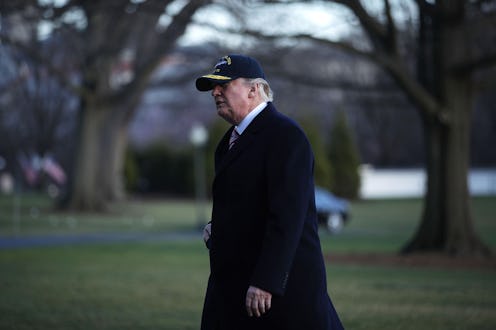News
The One Way Trump's Taxes Could Be Made Public

Although Donald Trump managed to become president without releasing his taxes, Democrats have been pursuing a strategy that would force the IRS to give the returns to Congress. So far, only Democrats had joined in this effort, but that changed on Thursday, when two House Republicans cosigned a letter demanding the release of Trump's tax returns from the last 10 years. If more Republicans follow suit, this could well be the thing that finally gets Trump's taxes out in the public.
This stems from a idea that originated with New Jersey Rep. Bill Pascrell. Congress does have the authority to request an individuals' tax returns from the IRS if the release of those returns would serve the public interest; specifically, it's the chairs of House Ways and Means Committee, the Senate Finance Committee and the Joint Committee on Taxation who have the power to make this request. Because the GOP controls both branches of Congress, these committee chairs are Republicans, and they've refused to ask the IRS to release Trump's taxes so far.
In February, Pascrell introduced a resolution that would direct the chair of the Ways and Means Committee to ask the IRS for Trump's taxes; the committee would then review the tax returns, and vote internally whether to release them to the entire House of Representatives. Although Democrats succeeded in forcing a vote on Pascrell's resolution, it failed along party lines.
But now, the campaign to make Trump's tax returns public is bipartisan. On Thursday, Pascrell circulated a letter around Congress, addressed to the relevant committee chairs and requesting that they ask the IRS for Trump's taxes. Almost all of the 193 House Democrats signed the letter — and so did Republican Reps. Mark Sanford and Walter Jones of North and South Carolina, respectively. The Carolina congressmen were the only House Republicans to vote "present" on Pascrell's resolution in February; now, they're actively joining Democrats.
So far, Sanford and Jones are the only Republicans in the House demanding that their fellow Republicans take action to get Trump's taxes. However, they have one ally in the Senate: Republican Susan Collins of Maine said in February that she would be open to subpoenaing Trump's tax returns as part of an investigation into Russia's alleged interference in the presidential election. Russia has denied any involvement.
There are really two takeaways here. The first is that we now have some very small, preliminary signs that the GOP is beginning to crack on the question of Trump's taxes. It's only a small trickle so far, and it's far too soon to say if it will turn into anything more, but it's worth keeping an eye on. From a pure optics standpoint, the difference between a partisan effort to get Trump's taxes and a bipartisan one is significant.
The second takeaway, though, is that if congressional Republicans don't sign on en masse to the request for Trump's taxes, Democrats will probably need to win control over one of the two branches of Congress in order to compel the IRS to release them. That makes the stakes in the 2018 midterms very high — and will give Democrats a strong talking point once election time rolls around.